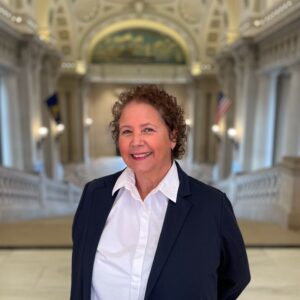 Leigh McNeil
Leigh McNeil
Assistant Director, Strategic Outreach
United States Naval Academy (MD)
What drew you to the world of college admission counseling?
It was really an accident…I first attended graduate school in the biological sciences and ended up teaching in higher education. I started writing grants and wrote one to start a dedicated math and science teacher licensure program at my university, and I discovered that I loved working with students…designing pathways for them to achieve their goals and dreams. I completed a Masters in Education, and that brought me to counseling and, ultimately, the U.S. Naval Academy. My first position at the Academy was as our STEM program coordinator, where I worked with younger students. I then transitioned to the role of regional admissions director, where I was responsible for applicants from the Midwest and Texas. Now I am the assistant director of strategic outreach, where I work with both applicants and my secondary school and community-based organization colleagues who are working with high school students applying to college.
What is your favorite part of the job?
It’s definitely the students. At my current institution, many of our applicants have been working toward attendance for much of their lives, some since middle school or earlier. Helping them with their applications so they put their best foot forward is a pleasure. I also appreciate the teamwork that is required to make this happen. My last team consisted of five active-duty lieutenants—two in Illinois and Michigan, one in Texas, and two stationed here at the Academy who were responsible for the rest of the Midwest; plus an examiner (who manages all the details of the applications in their final stages); and myself. During the pandemic lockdown, we “met” daily to catch the team up on our activities…we were all learning how to do our jobs remotely, which was new to most of us. We needed each other to figure out the best ways to manage these huge changes. After we returned to the office, we transitioned to weekly team meetings to share activity and—most important—best practices in our field. Each of us brings something different to the table, with different perspectives and experiences, and sharing ideas is what helped us pivot and be successful in this very new environment.
How has NACAC played a role in your career?
Since I came to counseling via an atypical pathway, NACAC has been instrumental in my transition. Because I came out of the sciences and research, I gravitate toward the national and regional meetings and the incredibly informative and important sessions on different topics. I also love the networking opportunities these meeting afford…again, sharing best practices, crowd-sourcing solutions, meeting others with different experiences that inform how I then view the world…all these can’t easily be replicated with an email or phone call. Plus, there are few opportunities to even meet people from outside your “bubble” if not for these meetings. Additionally, again because I come out of research and higher education from a different perspective, I especially enjoy presenting at these meetings. Sharing information with my high school and CBO counterparts and learning from them how I can help make the process of applying to a service academy more transparent and understandable is so important. I can do these things remotely, but I find that my colleagues are more likely to ask sensitive questions in person, rather than on a Zoom call or in a group. It’s that personal touch that makes a difference.
What do you think is the biggest challenge facing our profession today?
I think the pandemic lockdown changed all of us…the students, our high school colleagues, and those of us in higher education…and we are still trying to figure out how to manage all these changes. I don’t think we will ever be able to go back to the way things were “before.” The students see their pathways to achieving their goals differently than they had previously, and they have different expectations from postsecondary education than their older siblings and friends did.
Those of you working at the high school level are experiencing massive changes in your day-to-day lives, from the challenges posed by staffing shortages, the continued high numbers of students for whom you are responsible (exacerbated by the unprecedented resignations and retirements of teachers and counselors), and the educational challenges posed by the students themselves from the impact of remote learning on their current and future performance in the classroom, plus the mental health issues that came to light and were intensified by the isolation during the lockdown.
On the college side, we are trying to figure out the best ways to reach students and help them in selecting the best postsecondary path for them. The traditional school visit may no longer be the only way that we meet and speak with potential applicants. This brings me back to the networking that can happen through organizations like NACAC…how are my other postsecondary colleagues managing these changes at their schools? What do my high school colleagues need from me? I need to know!
When you aren’t working, what do you like to do?
I’m a voracious reader! You’d think that my background in the sciences would steer me in that direction, but I love history and current events. These books are the stories of our collective lives, and I love to read them.
If you could be any fictional character, who would it be and why?
Claudia from the young-adult novel From the Mixed-Up Files of Mrs. Basil E. Frankweiler. I have loved that book since I first read it in elementary school. I grew up in New York and have visited the Metropolitan Museum of Art many times, and even now—as an adult—I look around and think about how Claudia and her brother hid in the museum, and think about where I would hide if it was me in the book. It inspired a life of adventure.
Published Feb. 6, 2023